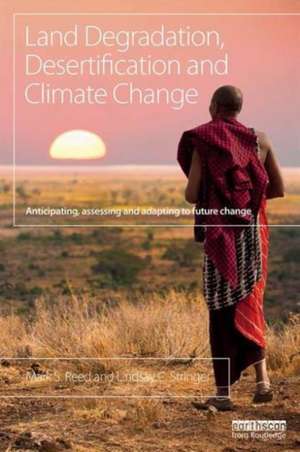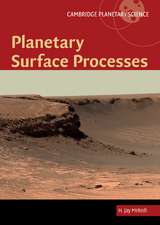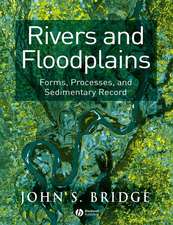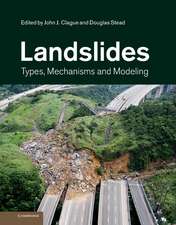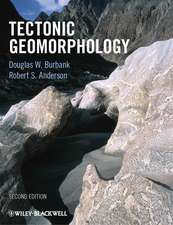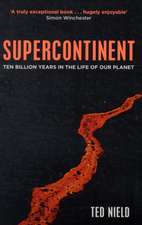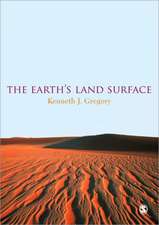Land Degradation, Desertification and Climate Change: Anticipating, assessing and adapting to future change
Autor Mark S. Reed, Lindsay C. Stringeren Limba Engleză Paperback – 26 apr 2016
The book discusses methods for monitoring effects of climate change and land degradation, and adaptations to these processes. It argues for better co-operation and knowledge exchange, so that the research, land user and policy communities can work together more effectively to tackle these challenges, harnessing the "wisdom of crowds" to assess vulnerability and adapt to climate change and land degradation, whilst protecting livelihoods and biodiversity.
| Toate formatele și edițiile | Preț | Express |
|---|---|---|
| Paperback (1) | 442.68 lei 6-8 săpt. | |
| Taylor & Francis – 26 apr 2016 | 442.68 lei 6-8 săpt. | |
| Hardback (1) | 766.26 lei 6-8 săpt. | |
| Taylor & Francis – 20 apr 2016 | 766.26 lei 6-8 săpt. |
Preț: 442.68 lei
Nou
Puncte Express: 664
Preț estimativ în valută:
84.71€ • 88.27$ • 70.14£
84.71€ • 88.27$ • 70.14£
Carte tipărită la comandă
Livrare economică 03-17 aprilie
Preluare comenzi: 021 569.72.76
Specificații
ISBN-13: 9781849712712
ISBN-10: 1849712719
Pagini: 198
Ilustrații: 5 black & white illustrations, 5 black & white line drawings
Dimensiuni: 156 x 234 x 19 mm
Greutate: 0.29 kg
Ediția:New.
Editura: Taylor & Francis
Colecția Routledge
Locul publicării:Oxford, United Kingdom
ISBN-10: 1849712719
Pagini: 198
Ilustrații: 5 black & white illustrations, 5 black & white line drawings
Dimensiuni: 156 x 234 x 19 mm
Greutate: 0.29 kg
Ediția:New.
Editura: Taylor & Francis
Colecția Routledge
Locul publicării:Oxford, United Kingdom
Cuprins
1. Introduction 2. Policy Context 3. Conceptual and Methodological Frameworks 4. Exposure and Sensitivity of Provisioning Ecosystem Services 5. Exposure and Sensitivity of Other Ecosystem Services and Feedbacks between Climate Change and Land Degradation 6. Responses 7. Monitoring and Evaluating Current and Future Effects of Climate Change and Land Degradation 8. Monitoring and Evaluating Response Options 9. Involving Stakeholders 10. Conclusion
Notă biografică
Mark S. Reed is a Professor of Socio-Technical Innovation at Newcastle University, UK. He was a Professor of Interdisciplinary Environmental Research at Birmingham City University until 2016, and prior to that, he was Director of the Aberdeen Centre for Environmental Sustainability at the James Hutton Institute and University of Aberdeen.
Lindsay C. Stringer is Professor in Environment and Development at the Sustainability Research Institute, School of Earth and Environment, University of Leeds, UK. She was Director of the Sustainability Research Institute from 2011-2014.
Lindsay C. Stringer is Professor in Environment and Development at the Sustainability Research Institute, School of Earth and Environment, University of Leeds, UK. She was Director of the Sustainability Research Institute from 2011-2014.
Recenzii
"As we embark on implementing the SDGs and new climate agenda, this book comes at the right point in time. By explaining the interconnections between climate change and land degradation in a scientifically sound yet easy to understand manner we are confident that this book will contribute to the identification of sustainable solutions which help to address the combined effects of land degradation and climate change. Such approaches are key to foster the closer cooperation between our Conventions on both the policy and the implementation level." - From the Foreword, by Christiana Figueres (Executive Secretary of the United Nations Framework Convention on Climate Change) and Monique Barbut (Executive Secretary of the United Nations Convention to Combat Desertification)
Descriere
This book identifies key vulnerabilities to the combined effects of climate change and land degradation around the world and identifies triple-win adaptations that can tackle both climate change and land degradation, whilst supporting biodiversity and ecosystem services.
